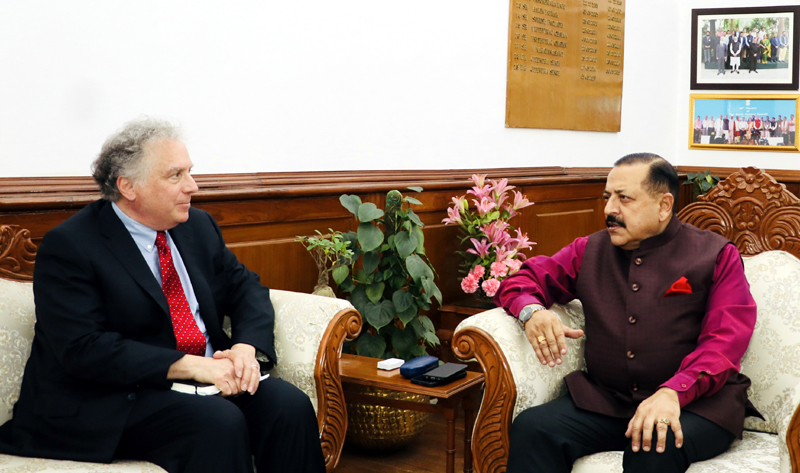
Excelsior Correspondent
NEW DELHI, Mar 22: Union Minister of State (Independent Charge) Science & Technology; Minister of State (Independent Charge) Earth Sciences; MoS PMO, Personnel, Public Grievances, Pensions, Atomic Energy and Space, Dr Jitendra Singh today proposed India’s extended collaboration in Biotech StartUps and Vaccine development in Public Private Partnership for Global Good.
Speaking to Dr. Mark Feinberg, President & CEO, IAVI (The International AIDS Vaccine Initiative) and Rajat Goyal MD, Country Director, India, IAVI, who called on him at North block here along with a high profile delegation, the Minister urged for concrete proposals and guidance in developing Sustainable StartUps for lasting source of livelihoods.
Dr Jitendra Singh said that India is fast emerging as the world’s major bio-economy and over the last few years, it has grown by leaps and bounds when it comes to innovation and technology. He pointed out that India has developed four indigenous Vaccines in just two years.
The Minister added that the Department of Biotechnology (DBT) in Ministry of Science & Technology has through “Mission COVID Suraksha”, delivered four vaccines, augmented the manufacturing of Covaxin, and created necessary infrastructure for smooth development of future vaccines, so that our country is pandemic ready.
Dr. Mark Feinberg, President & CEO, IAVI said that his organization is a global not-for-profit, public-private partnership working to accelerate the development of vaccines to prevent HIV infection and AIDS. He, however added that due to abatement of HIV, IAVI is partnering with India for the development of TB Vaccine.
Dr Jitendra Singh underlined that the Indian vaccine market, which has carved out a place for itself at the global level, is expected to reach a valuation of Rs 252 billion by 2025.
The key initiatives and research projects established through the DBT-IAVI partnership are –India-South Africa Bilateral Collaboration initiated in 2011 has led to the following key outcomes: Phase I collaboration (2011-2016) brought together isolated Centres of Research Excellence (7 each) across India and South Africa, Trained 1 Indian researcher in South Africa and 3 South African researchers in India in next-generation technologies. Technology transfer in key technical approaches – Yeast surface display and surface plasmon resonance. Knowledge, data and resource sharing for comparative research- Exchange of biological specimens, sharing of research materials, reagents and protocols and Interdisciplinary approach focusing on region-specific needs and contributing to global knowledge.
Dr Jitendra Singh informed that during the Phase II collaboration (2017-till date), 8 CoEs across India and South Africa including 5 new CoEs in Phase II, 3 South African researchers trained in India; Indian researchers trained by South African researchers on Tandem Mass Spectrometry – 1st TDM lab for TB drugs established in India at P.D. Hinduja Hospital, Technology transfer to S Africa on Env purification & MIC testing, sharing of protocols from SA to India for assessment of Skin pigmentation, Exchange of virus sequences & bnAbs across Indian & S African labs – Most clinically advanced bnAb (CAP256.VRC26.25 mAb) shared by SA to India, 15 publications in peer-reviewed journals, 1 patent granted in South Africa for novel engineered immunogen from Indian HIV-1 C (THSTI & YRGCARE), The neutralization assays representing circulating HIV-1 viruses in India and South Africa, developed under this collaboration, are being used for suitability assessment of bnAbs to develop bnAb cocktail for HIV prevention.
A joint MoU was signed between DBT, New Delhi and IAVI on 7th July, 2005 for participating jointly in research and development in evaluation of one or more safe and effective AIDS vaccines that was subsequently extended till July 2020.

